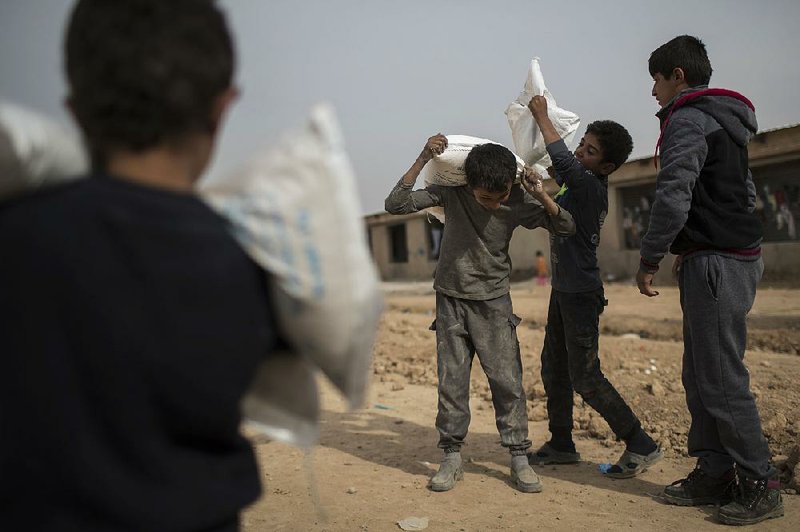BAGHDAD -- Iraqi troops fired at positions held by the Islamic State extremist group in and around the northern city of Mosul on Thursday but did not advance as they regrouped and cleared neighborhoods once occupied by the extremists, military officials said.
RELATED ARTICLE
http://www.arkansas…">Forces closing circle near ISIS 'capital'
Troops are screening people fleeing from Mosul, searching for any Islamic State militants trying to sneak out among the more than 34,000 civilians fleeing to displacement camps and host communities in nearby provinces.
Amnesty International reported allegations against security forces of arbitrary detention, forced disappearances and ill-treatment of prisoners, including an account that up to six people were "extrajudicially executed" in late October over suspected ties to the Islamic State group.
The London-based rights organization said the purported killings took place near Shura and Qayara outside Mosul, and it urged the government to investigate.
"Men in federal police uniform have carried out multiple unlawful killings, apprehending and then deliberately killing in cold blood residents in villages south of Mosul," said Lynn Maalouf, deputy director for research at Amnesty's Beirut office.
"In some cases the residents were tortured before they were shot dead execution-style," she said, adding that it was "crucial" for Iraqi authorities to bring those responsible to justice.
"Without effective measures to suppress and punish serious violations, there is a real risk that we could see war crimes of this kind repeated in other Iraqi villages and towns during the Mosul offensive," Maalouf added.
Prime Minister Haider al-Abadi denied the report, calling it "incorrect information," and saying in a statement that Islamic State fighters were the ones responsible for the killing of civilians.
Since the offensive to retake Iraq's second-largest city began Oct. 17, the Shiite-led government has tried to prevent revenge attacks against the mainly Sunni residents of Mosul and surrounding areas. State-sanctioned Shiite militias and Kurdish forces say they won't enter the city, and the government has vowed to investigate any human-rights violations and hold people accountable.
In late October, an Iraqi manning a checkpoint south of Mosul with soldiers, federal police and local militiamen said he personally killed two men he said he knew to be Islamic State militants because he saw them commit crimes. His account could not be independently confirmed.
Soldiers at the checkpoint also said they had heard reports of suspected Islamic State fighters being beaten and killed by security forces. One private said the alleged abuses were supposedly carried out by tribal and militia fighters in apparent revenge attacks.
At the time, military spokesman Brig. Gen. Yahya Rasool said officials had not registered "any violation of any kind by the security forces against civilians."
Iraqi troops are converging from several fronts on Mosul, the last major Islamic State holdout in Iraq. Kurdish peshmerga forces are holding a line north of the city, while Iraqi army and militarized police units approach from the south, and government-sanctioned Shiite militias are guarding western approaches.
Col. John Dorrian, a spokesman for the U.S.-led forces operating the air campaign against the Islamic State militants, said advancing troops and aircraft have destroyed some 70 tunnels the jihadis had been using for surprise attacks inside densely populated areas.
"They've set up elaborate defenses, and we have to assume they'll do anything among the civilian population because they don't care about anyone," he said, noting that airstrikes had hit hundreds of Islamic State positions in the 3-week-old Mosul campaign.
In eastern Mosul, where troops have a foothold in a sliver of territory, special forces control the Zahra neighborhood, once named for former dictator Saddam Hussein,
They have taken at least half of the Aden neighborhood, where clashes were ongoing, while the regular army's 9th Division is stationed in the Intisar neighborhood, military officials said, speaking on condition of anonymity because they were not authorized to brief reporters. Skirmishes also continued in the southern outskirts.
The offensive has slowed recently as the special forces -- the troops that have advanced the farthest -- push into more densely populated areas of eastern Mosul, where they cannot rely as much on airstrikes and shelling because of the risk to civilians who have been told to stay in their homes.
In the south, forces are positioned at the town of Hamam al-Alil, said Brig. Firas Bashar, the spokesman for Nineveh operations command.
To the northeast, about 8 miles from Mosul, the peshmerga continued to take territory in the town of Bashiqa, believed to be largely deserted except for dozens of Islamic State fighters. The peshmerga have surrounded the town for weeks, assaulting it with mortar and artillery fire.
At a church in newly freed territory, priests rang bells Wednesday for the first time in two years.
"We are so happy at the liberation," said the Rev. Elkhoury Alfaran Elkhoury of the Mart Shoomy Church in the village of Bahzani, near Bashiqa.
"They want to give a message to the world, and that message is damage, their message is destruction, their message is death," he said, pointing out what the jihadis had done to the church while they occupied the area.
Information for this article was contributed by Susannah George of The Associated Press.
A Section on 11/11/2016

